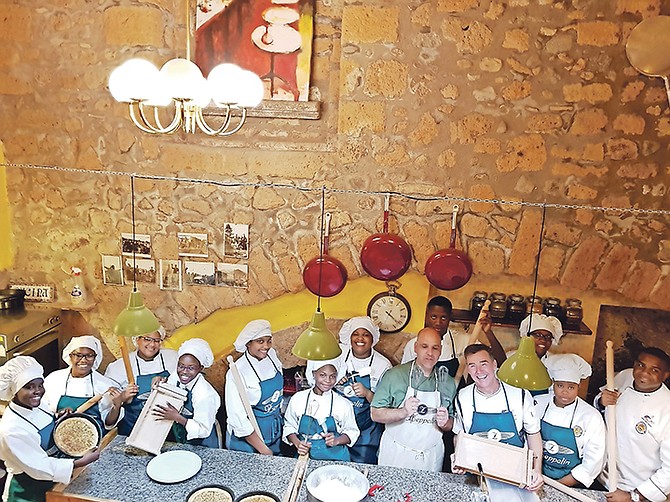Culinary Arts and Tourism Studies Executive Director J Desmond Keefe, Chef Lorenzo Pelegri, Assistant Professor/Coordinator Chef Mario Adderley with UB students on a study abroad immersion in Italy.
“Cooks and chefs are the backbone of the hospitality industry in any market and especially a thriving tourism market, where customers travel from far away to experience a relaxing vacation while dining on the local specialties. A major trend taking place currently in the hospitality industry worldwide and in The Bahamas is Culinary Tourism,” says chef J Desmond Keefe the executive director of Culinary Arts and Tourism Studies at University of The Bahamas.
Erik Wolf, founder of The World Culinary Tourism Association, states: “Getting to know another culture through travel, and subsequently through local food, is one of the best educational opportunities available to us, yet one of the most undervalued.”
Climbing the Eiffel Tower or swimming with dolphins are great photo ops and offer us a chance to tell stories and compare notes with other travelers, but most of us reflect on the memorable meals enjoyed while traveling more than anything else.”
One of the largest new markets in travel and tourism today is millennials and here in The Bahamas we are learning that this group craves authenticity. They want to eat and drink what the locals enjoy. They want to know the origins of the dish and of course they want to post on social media where they are and what they are eating and drinking. Since there are 79 million millennials, it’s a good idea to give them what they want. How do we do that? Getting a quality education at a reputable culinary school is a good start.
Culinary education is where many successful chefs began their careers. Learning the fundamentals is more than proper knife cuts and cooking methods. It is about attitude. Paul Sorgule, former Vice President of the New England Culinary Institute and author of many articles on culinary education, writes about the benefits of the “Yes Chef” attitude and lists the reasons why it is important.
They include: efficiency, morale, pride, respect and working towards a common goal. The desire to work with the freshest ingredients and highlight them in a dish and to present them with flair and skill are all benefits of a quality education in culinary arts. Many young culinarians believe that owning a restaurant is the ultimate success.
While it is certainly a measure of success to own and operate a thriving business, there are many other ways to achieve success in your chosen profession. Advancing to a management position, such as lead-line cook or sous chef is how many young culinarians have moved up from working the line to running a large culinary operation such as the many hotels and resorts here in The Bahamas, explained Keefe.
Chef Keefe who previously served as chair of Culinary and Interim Dean at Southern New Hampshire University asserts that, “research shows that the higher the level of education achieved the higher the income that can be expected. In addition, cooks and chefs with culinary degrees have greater opportunity for advancement and are less likely to be subject to layoffs during the off season. It takes a special kind of person to work in the hospitality industry and particularly in culinary arts.
“We can thank the Food Network for the notoriety that chefs have gained we now. Celebrity chefs are now on a par with rock stars and many have opened signature restaurants in resorts around the world. Most of us will not “Beat Bobby Flay” or win “Cupcake Wars” but there is a level of success achieved by gaining a classic culinary education at an accredited culinary programme such as the Culinary Arts and Tourism Studies programme at University of The Bahamas (UB).”
One such alumna, Kenria Taylor, AA’17 last summer clinched the coveted gold at the Taste of the Caribbean competition for her spiced rubbed beef with a tamarind reduction, corn dusted coconut marinated shrimp served alongside a sweet potato puree, sweet potato and thyme waffle with charred pineapple syrup, warm chayote and carrot slaw. This mouth-watering, exquisite dish impressed the palates of judges, and secured her a major international win.
“To receive a gold medal, Junior Chef of The Year and be inducted into the CHTA Hall of Fame in my first competition is mind blowing in itself but it just proves that trusting, waiting and allowing God to intercede in your life will always reap reward,” explained Taylor.
She credits much of her success to the high level of training and teaching she received during her tenure at University of The Bahamas. “Through receiving my educational foundation at University of The Bahamas, I have not only been able to expand on my prior knowledge of the culinary industry but gain experience within the field. University of The Bahamas sets a standard when compared to other local and international institutions through its Industry Training Programme and lab-based curriculum that provides a theoretical aspect of learning as well as a practical,” says the award winning chef.
“Kenria is proof of the high-level educational experiences offered at UB by top chefs who help to propel UB students to the next level and fuel a passion for life-long learning as they advance in the culinary profession locally or internationally,” expressed Keefe.
“Gain An Edge” is a weekly collaboration of the Lyford Cay Foundations, Bahamas Technical and Vocational Institute and University of The Bahamas aimed at promoting a national dialogue on higher education. To share your thoughts, email gainanedge@tribunemedia.net.





Comments
Use the comment form below to begin a discussion about this content.
Sign in to comment
Or login with:
OpenID